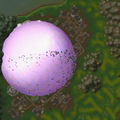Because a certain member of the forums (*cough* typedef *cough*) is a retard (apparently me using typdef on functions pointers is impossible and means I must have "shit for brains" -- his words) I figured other people must suffer from the same misconception so I will explain how to use a typedef with functions or function pointers.
Note: These are all REAL WORLD examples from one of my projects, so typedef (the person) can't go "ZOMG THIS NO WORK" because I'm using it right now and it does.
Functions:
When writing a callback system for my console I needed choose a function prototype all the callbacks would follow, I chose the following:
In order to make writing the callback system easier on myself I used 'typedef' to create a type synonym for the callback prototype:Code:void __cdecl CallbackName(const std::string& Params);
I could then use the type "ConsoleCallback" instead of typing out the ugly type definition I would have to otherwise. An important thing to note is typedef defines a TYPE SYNONYM, meaning the word actually is a type, it is NOT a 'define' that just copy-pastes using the preprocessor before the compiler takes over, the compiler sees "ConsoleCallback" as a type and treats it as such.Code:typedef void (__cdecl ConsoleCallback) (const std::string &);
You can then use the new type synonym as such:
std::map<std::string,ConsoleCallback*> ConsoleCallbacks;
Code:void __cdecl TestCallback(const std::string&) { ; } void RegisterConsoleCallback(const std::string& Name, ConsoleCallback* Callback) { ConsoleCallbacks[Name] = Callback; } void RegisterCallbacks() { RegisterConsoleCallback("test",&TestCallback); } std::string Submit( const char * /*pszArgs*/, CElement * pThis ) { std::string sString(pThis->GetString()); string Command = sString.substr(0, sString.find(" ")); string Args = sString.substr(sString.find(" ")+1,sString.size()); std::transform(Command.begin(), Command.end(), Command.begin(), tolower); if (ConsoleCallbacks[Command]) { ConsoleCallback* pMyCallback = ConsoleCallbacks[Command]; (*pMyCallback)(Args); } else { WriteOutput("Invalid command."); } pThis->SetString(""); return std::string(); }
Function Pointers:
Typedefs are also useful when calling game function from an injected DLL in the form of a function pointer, this is great because you can avoid the use of inline ASM and have the compiler take care of the stack for you (and generate 'better' ASM because there are no __asm blocks that hinder the compiler's optimizer).
Example (from my fishbot, modified, unrelated code removed):
You can then use the code to cast for example 'Fishing (Apprentice)' which has ID 7620.Code:typedef bool (__cdecl * tCastSpellById)(unsigned int SpellId, unsigned int Unk2, unsigned int Unk3, unsigned int Unk4); tCastSpellById oCastSpellById = 0; void SetupMiscFunctions() { oCastSpellById = (tCastSpellById)GetRPMgr()->GetFindPattern()->GetAddress("CSpell::CastSpellById"); } void CastSpell(unsigned int SpellId) { oCastSpellById(SpellId,0,0,0); }
Hopefully now everyone can see you CAN use 'typedef' to define function and function pointer type synonyms.
Shout-Out
User Tag List
Results 1 to 15 of 17
-
12-31-2008 #1
 Kynox's Sister's Pimp
Kynox's Sister's Pimp

- Reputation
- 1358
- Join Date
- Apr 2006
- Posts
- 5,368
- Thanks G/R
- 0/6
- Trade Feedback
- 0 (0%)
- Mentioned
- 0 Post(s)
- Tagged
- 0 Thread(s)
The typedef keyword. Functions, function pointers, and you.
Last edited by Cypher; 01-07-2009 at 12:08 AM.
-
12-31-2008 #2Banned



- Reputation
- 402
- Join Date
- Nov 2007
- Posts
- 1,697
- Thanks G/R
- 0/0
- Trade Feedback
- 0 (0%)
- Mentioned
- 0 Post(s)
- Tagged
- 0 Thread(s)
lol nice read.. i understood it all =)
-
12-31-2008 #3
 Contributor
Contributor

- Reputation
- 97
- Join Date
- May 2008
- Posts
- 393
- Thanks G/R
- 0/0
- Trade Feedback
- 0 (0%)
- Mentioned
- 0 Post(s)
- Tagged
- 0 Thread(s)
I'm shit at C/++ and even I considered this within the realm of common knowledge.
-
12-31-2008 #4Member

- Reputation
- 19
- Join Date
- Nov 2007
- Posts
- 65
- Thanks G/R
- 0/0
- Trade Feedback
- 0 (0%)
- Mentioned
- 0 Post(s)
- Tagged
- 0 Thread(s)

This looks like its an irc screenshot, is there a mmowned irc channel?
-
12-31-2008 #5Active Member


- Reputation
- 239
- Join Date
- Jan 2007
- Posts
- 198
- Thanks G/R
- 0/0
- Trade Feedback
- 0 (0%)
- Mentioned
- 0 Post(s)
- Tagged
- 0 Thread(s)
-
12-31-2008 #6Active Member


- Reputation
- 50
- Join Date
- Mar 2007
- Posts
- 1,033
- Thanks G/R
- 0/1
- Trade Feedback
- 0 (0%)
- Mentioned
- 0 Post(s)
- Tagged
- 0 Thread(s)
Okay, here's a semi-related question. Let's say I find GetObjByGUID in IDA. It says it has 3 arguments, but I'm thinking two of those are going to be used for the LONGLONG GUID. Which two is it? And what is the other param for?
This was my first thought:
Code:typedef DWORD (__cdecl * tGetObjByGuid)(__int64 GUID, unsigned int unk1); tGetObjByGUID oGetObjByGUID = 0x46D3C0;
Last edited by lanman92; 12-31-2008 at 12:51 PM.
-
12-31-2008 #7
 Kynox's Sister's Pimp
Kynox's Sister's Pimp

- Reputation
- 1358
- Join Date
- Apr 2006
- Posts
- 5,368
- Thanks G/R
- 0/6
- Trade Feedback
- 0 (0%)
- Mentioned
- 0 Post(s)
- Tagged
- 0 Thread(s)
It would probably be something like this:
typedef CGObject_C* ( __cdecl* tGetObjectByGUID)(unsigned long GuidLow, unsigned long GuidHigh, int FilterMask);
Orrrr. You could replace it with:
typedef CGObject_C* ( __cdecl* tGetObjectByGUID)(WoWGUID FullGuid, int FilterMask);
EDIT:Code:struct WoWGUID { union { __int64 FullGuid; struct { unsigned long High; unsigned long Low; }; unsigned char Bytes[8]; // Used for packing/unpacking GUIDs in packets (CPacketManager::PackGuid, CPacketManager::UnpackGuid) }; };
The screenshot is from the MMOwned shoutbox.Last edited by Cypher; 12-31-2008 at 12:58 PM.
-
12-31-2008 #8Active Member


- Reputation
- 50
- Join Date
- Mar 2007
- Posts
- 1,033
- Thanks G/R
- 0/1
- Trade Feedback
- 0 (0%)
- Mentioned
- 0 Post(s)
- Tagged
- 0 Thread(s)
Ah, thanks Cypher. Should've gone to the wowdev page... Think they have that struct posted. What does the filter do?
-
12-31-2008 #9
 Kynox's Sister's Pimp
Kynox's Sister's Pimp

- Reputation
- 1358
- Join Date
- Apr 2006
- Posts
- 5,368
- Thanks G/R
- 0/6
- Trade Feedback
- 0 (0%)
- Mentioned
- 0 Post(s)
- Tagged
- 0 Thread(s)
You can filter objects by type (unit, player, gameobject, etc).
-
12-31-2008 #10Active Member


- Reputation
- 50
- Join Date
- Mar 2007
- Posts
- 1,033
- Thanks G/R
- 0/1
- Trade Feedback
- 0 (0%)
- Mentioned
- 0 Post(s)
- Tagged
- 0 Thread(s)
But, if it only returns one object, what's the point of that?
-
12-31-2008 #11
 Contributor
Contributor

- Reputation
- 97
- Join Date
- May 2008
- Posts
- 393
- Thanks G/R
- 0/0
- Trade Feedback
- 0 (0%)
- Mentioned
- 0 Post(s)
- Tagged
- 0 Thread(s)
He's talking about those received by packet-logging.
-
12-31-2008 #12Active Member


- Reputation
- 50
- Join Date
- Mar 2007
- Posts
- 1,033
- Thanks G/R
- 0/1
- Trade Feedback
- 0 (0%)
- Mentioned
- 0 Post(s)
- Tagged
- 0 Thread(s)
Oh. Gotcha.
-
12-31-2008 #13
 ★ Elder ★
★ Elder ★

- Reputation
- 1280
- Join Date
- Mar 2007
- Posts
- 1,238
- Thanks G/R
- 0/3
- Trade Feedback
- 0 (0%)
- Mentioned
- 0 Post(s)
- Tagged
- 0 Thread(s)
Happy new year u mofos, if you live in a gmt+1 zone!

-
12-31-2008 #14
 Retired Noggit Developer
Retired Noggit Developer


- Reputation
- 755
- Join Date
- Nov 2006
- Posts
- 2,759
- Thanks G/R
- 0/3
- Trade Feedback
- 0 (0%)
- Mentioned
- 0 Post(s)
- Tagged
- 0 Thread(s)
And happy new year, if you live in GMT now.

-
12-31-2008 #15
 Kynox's Sister's Pimp
Kynox's Sister's Pimp

- Reputation
- 1358
- Join Date
- Apr 2006
- Posts
- 5,368
- Thanks G/R
- 0/6
- Trade Feedback
- 0 (0%)
- Mentioned
- 0 Post(s)
- Tagged
- 0 Thread(s)
GUIDs in packets are "packed" to reduce their size. When dealing with packed GUIDs its much easier to treat them as an array of bytes.
Similar Threads
-
Ending the Bloodcurse and You
By slothahoy in forum World of Warcraft ExploitsReplies: 12Last Post: 05-10-2007, 09:21 AM -
Wyvern >>> Phoenix (And you don't need the ModelChange208.exe)
By Soren93 in forum World of Warcraft Model EditingReplies: 17Last Post: 04-19-2007, 05:18 AM -
The Search Button and YOU
By Finnster in forum World of Warcraft GeneralReplies: 2Last Post: 10-23-2006, 06:45 PM







 Reply With Quote
Reply With Quote










